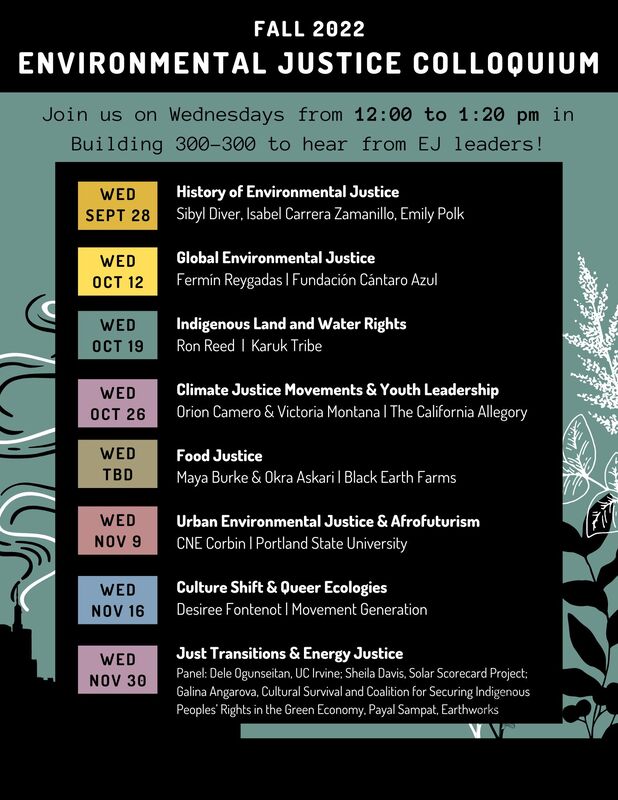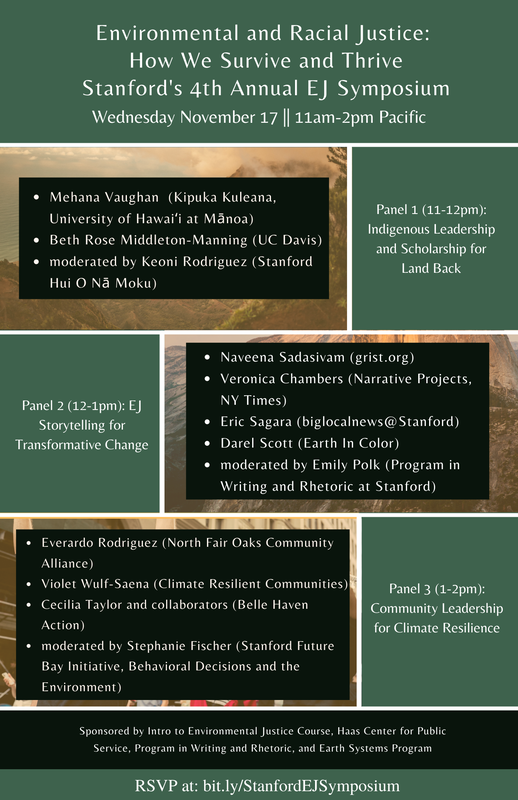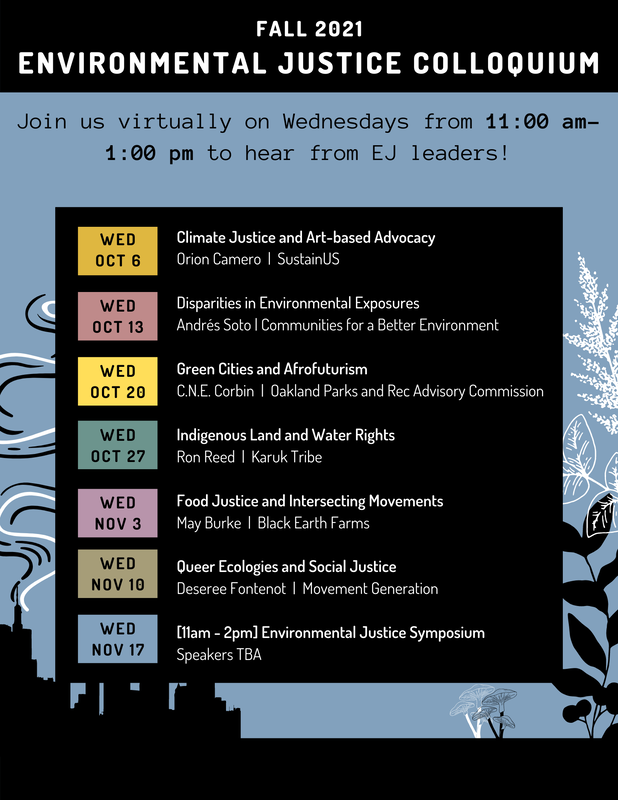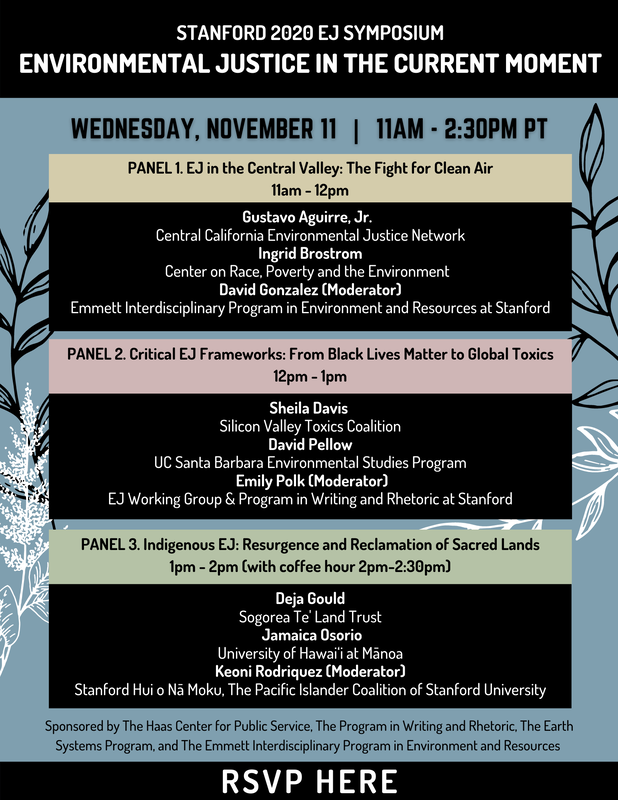Fall 2023
Building Environmental Justice Coalitions for Change, From Local to Global
6th Annual EJ Colloquium
Wedflynesday, Nov 29th, 2023 (virtual)
11:30 am -1:30 pm (Pacific)
Panel 1 (11:30-12:30pm): Water Justice | Featuring members of the Delta Tribal Environmental Coalition (DTEC)
Panel 2 (12:30pm-1:30pm): Energy Justice and Responsible Mining | featuring members of the SIRGE Coalition (Securing Indigenous Peoples’ Rights in the Green Economy)
6th Annual EJ Colloquium
Wedflynesday, Nov 29th, 2023 (virtual)
11:30 am -1:30 pm (Pacific)
Panel 1 (11:30-12:30pm): Water Justice | Featuring members of the Delta Tribal Environmental Coalition (DTEC)
Panel 2 (12:30pm-1:30pm): Energy Justice and Responsible Mining | featuring members of the SIRGE Coalition (Securing Indigenous Peoples’ Rights in the Green Economy)
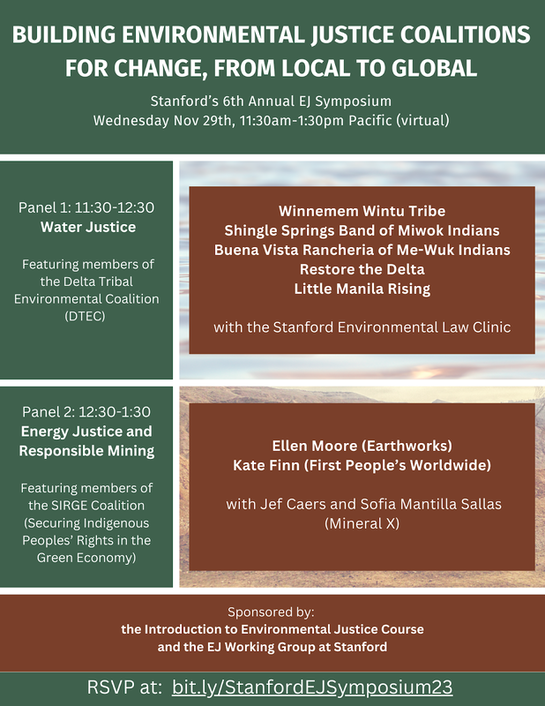
Stanford’s 6th Annual EJ Symposium highlights building EJ coalitions for change from local to global scales
This November 29, the Introduction to EJ course and EJ Working Group hosted the 6th Annual Environmental Justice Symposium, "Building Environmental Justice Coalitions for Change, From Local to Global," with generous support from the Haas Center and Earth Systems Program. Almost one hundred attendees joined us for a water justice panel, featuring members of the Delta Tribal Environmental Coalition (DTEC) with Stanford Environmental Law Clinic attorneys. This was followed by a panel on Energy Justice and Responsible Mining, featuring members of the SIRGE Coalition (Securing Indigenous Peoples’ Rights in the Green Economy) with Stanford's own Mineral-X project. Students and community attendees benefited from an unsiloed conversation about how experts from diverse backgrounds are building coalitions for collection action, highlighting strategies that range from engaged research and citizen science, to legal advocacy and community organizing. We especially extend our thanks to coalition participants:
This November 29, the Introduction to EJ course and EJ Working Group hosted the 6th Annual Environmental Justice Symposium, "Building Environmental Justice Coalitions for Change, From Local to Global," with generous support from the Haas Center and Earth Systems Program. Almost one hundred attendees joined us for a water justice panel, featuring members of the Delta Tribal Environmental Coalition (DTEC) with Stanford Environmental Law Clinic attorneys. This was followed by a panel on Energy Justice and Responsible Mining, featuring members of the SIRGE Coalition (Securing Indigenous Peoples’ Rights in the Green Economy) with Stanford's own Mineral-X project. Students and community attendees benefited from an unsiloed conversation about how experts from diverse backgrounds are building coalitions for collection action, highlighting strategies that range from engaged research and citizen science, to legal advocacy and community organizing. We especially extend our thanks to coalition participants:
- The Delta Tribal Environmental Coalition (“DTEC”), is an alliance of Native American tribes and community-based social and environmental justice organizations working together to achieve justice and equity related to water rights, policy, management, and flows in California. DTEC includes the Buena Vista Rancheria of Me-Wuk Indians, Shingle Springs Band of Miwok Indians, Winnemem Wintu Tribe, Little Manila Rising, and Restore the Delta, with representation by the Stanford Environmental Law Clinic. DTEC’s work includes efforts to update water quality standards in California’s Bay-Delta watershed to protect tribal beneficial uses and the health and welfare of disadvantaged communities, efforts to advance participatory water governance in California, and campaigns to realize tribal water rights and justice in California. DTEC’s Complaint under Title VI of the Civil Rights Act against the State Water Resources Control Board over discriminatory water governance in the Bay-Delta is currently under investigation by the U.S. Environmental Protection Agency. (Photo credit: the San Joaquin River along Brannan Island Road in Isleton, Gary Coronado / Los Angeles Times)
- The SIRGE Coalition -- Securing Indigenous Peoples’ Rights in the Green Economy -- a international collective of Indigenous Peoples and leaders, who, along with our allies, champion just energy transition--especially around mining of transition minerals such as nickel, lithium, cobalt, and copper being promoted as critical to a green, low carbon economy. While demand for transition minerals for EV battery technology is skyrocketing, increased mining for these resources threatens Indigenous rights and territories that contain significant concentrations of transition mineral reserves. Because a sustainable and just energy transition cannot be achieved at the expense of the rights of Indigenous and local communities, the SIRGE coalition is advocating for governments and companies involved in the new green economy to observe and implement rights enshrined in the UN Declaration on the Rights of Indigenous Peoples, including the right to Free, Prior and Informed Consent.
Fall 2022
Fall 2021
Stanford's 4th Annual EJ Symposium
Environmental & Racial Justice:
How We Survive and Thrive
Wednesday, Nov 17 | 11am-2pm PT | Virtual; Open to All
CLICK HERE FOR EVENT RECORDING
Click here for a resource document where you can find links to resources that were mentioned during the discussions, including previous work our panelists have done, and opportunities to get involved in this work, including student internships!
Environmental & Racial Justice:
How We Survive and Thrive
Wednesday, Nov 17 | 11am-2pm PT | Virtual; Open to All
CLICK HERE FOR EVENT RECORDING
Click here for a resource document where you can find links to resources that were mentioned during the discussions, including previous work our panelists have done, and opportunities to get involved in this work, including student internships!
